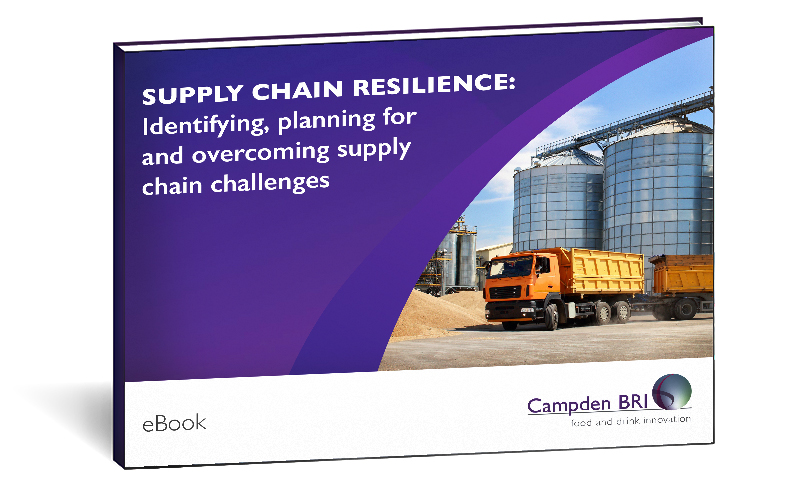
Attending the Institute of Food Science and Technology (IFST) Spring conference 2023
23 May 2023 | Craig Leadley, Technology Fellow and Megan Jones, Scientific Content Manager
On Thursday 27th April 2023, we attended the Institute of Food Science and Technology (IFST) Spring Conference 2023 (SC23) at Cardiff Metropolitan University. The theme was ‘Taming the Perfect Storm - The Power of Food Science and Technology’, namely considering how we might balance and holistically address current health, nutrition, food security and environmental challenges across the whole food system.
Through our joint sponsorship of this event, and the support we provide to our members and clients, we help further the development and practical applications of research, knowledge and communication across the food and beverage industry.
For anyone who missed it, here’s an overview of what was covered at the conference
Presentation - Keynote Speaker
Julie Hesketh-Laird, Deputy Chief Executive, Food Standards Scotland (FSS).
Julie works closely with the Food Standards Scotland CEO and Board to ensure FSS delivers on its objectives across its whole range of functions, from ensuring food safety and business compliance, to Local Authority delivery. Julie is passionate about driving excellence in Scotland’s food & drink and how it is farmed, caught, processed, packaged, marketed and sold and ensuring that good regulation can enhance further the reputation of Scotland and its food and drink sector.
Julie's speech set the scene for the day with data about the strain on our food system, both globally and in the UK and Scotland, including some concerning statistics for the impact on nutrition and health. For example, between 1 in 5 and 1 in 4 have cut back on essentials such as food in early 2023 [data from Scottish Government].
Julie covered affordability and availably factors of food security as well as what FSS is doing to tackle challenges of food security, dietary health and environmental protection, using a systems level approach. From new farming systems and breeding technologies to non-plastic packaging, the Good Food Nation (Scotland) Act, and the application and promotion of the Eatwell Guide pictorial tool and associated booklet.
The key challenges discussed were public sector resourcing, pressure on science / technology, data sharing, and a changing population. It was clear from Julie’s talk that food security, public health and the environment are all interlinked. Whilst this may seem a daunting prospect, Julie also emphasised that positive progress in one area can improve the other areas too.
Food security and the environment
Transforming food system outcomes: who needs to do what?
Dr John Ingram, Food System Transformation Programme Leader at ECI, University of Oxford; IFSTAL.
Dr John Ingram’s talk was all about visualisation – how we think about and approach these big and complex challenges, and most importantly how we can simplify our thinking in order to determine the actions required. Rather than the term ‘sustainable diet’, John finds it much more informative and helpful to think about the aim of everyone having "a healthy diet that comes from a sustainable food system".
“Sufficient” was also a key message, i.e. enough for a given purpose – we all need a sufficient, safe, nutritious diet. It is from this that we can expand thinking about “the right to food” into thinking about a more accurate “the right to the right food”.
All 9 elements that John spoke about are needed for food security that is stable over time. These 9 elements discussed include:
- Food utilisation – 1. Nutritional value, 2. Social Value, 3. Food Safety,
- Food access – 4. Affordability, 5. Allocation, 6. Preference,
- Food access – 7. Production, 8. Distribution, 9. Exchange.
The key message was that in order to transform the socioeconomic, food security and environmental outcomes of our food system, we need to reassess policy and adapt the activities within the food system. And – perhaps most importantly – any system has to be assessed in terms of trade-offs, i.e. we must take meaningful action towards the path that minimises harm and must not be held back by wanting unrealistic perfection.
Download our FREE Supply Chain Resilience eBook today! Thrive in a changing environment by being prepared, agile and resilient.

A Vision of the Food System, 2045 CE: Smart People, Smart Processes, Smart Factories
Dr Wayne Martindale, Associate Professor, National Centre for Food Manufacturing (NCFM).
Dr Wayne Martindale focussed on the disparity of food loss and food waste between different areas of the world as well as how the climate is affecting this and how we can use data to support our efforts to make improvements.
Wayne focussed on the impact of climate change on food security and how we need to move from ‘crisis thinking’ into ‘strategic thinking’ and put strategies in place to deal with what is coming. This includes making better use of the data available to us and taking action on a global scale.
The key “how?” of this was answered by Wayne’s emphasis on integrating people into food systems and the importance of focusing on people when looking to ‘transform’ these systems. With his ‘S3’ project – Smart People, Smart Processes, Smart Factories – Wayne and the project team are exploring how technology can be used to map how resources and people move around a food factory in order to explore impacts of changes via a digital twin.
Environment and nutrition
Microbial Protein: the Future of Green Pharming
Dr Matthew Longshaw, Senior Scientist, Calysta.
Calysta use methane feedstocks and microbial fermentation to produce a high protein biomass that they convert into animal feed. Different fractions of the biomass extraction / separation have different functionalities and the product has been tested as a food for a wide range of marine and land animals
With production in Teeside and China, they have an ambitious vision for the future in terms of their aims to use synthetic gas (‘green methane’) as their input and make the operation carbon negative.
Shifting the environment: making healthy and sustainable diets the norm in retail settings
Dr Vicki Jenneson, Public Health Nutritionist, Leeds Institute for Data Analytics.
With just 1% of the UK population meeting the Eatwell recommendations with their diet, Dr Vicki Jenneson’s talk focussed on the analysis of nutrition and consumer data, as well as how this data could be applied.
Just some of what was discussed in the talk and Q&A was the need to consider land and water usage rather than only the carbon emissions / ‘carbon footprint’ of a product or process, as well as the possibility for this to extend into sustainability labelling.
The main focus was on the power of retailers (in the context of 9/10 people in the UK regularly buying their groceries from supermarkets), with respect to the impacts of sourcing, ranging, marketing / messaging and monitoring – which brought things nicely back to the data.
This concept was brought to life through the details of the trials conducted with Sainsburys and ASDA via the IGD Healthy and Sustainable Diets working group, whereby the impact was assessed for measures designed to encourage consumers to purchase more fruit, veg and plant-based meat alternatives.
Nutrition and food security
Innovation Sweet Spot: Steering food technology towards improving health and food environments
Parita Doshi, Deputy Director, 'A Healthy Life' mission team, Nesta.
Nesta design, test and scale new solutions to society’s biggest problems, for social good. With the 'A Healthy Life' mission team's goal being to increase the average number of healthy years lived in the UK, they have an ambitious aim of halving the prevalence of UK obesity by 2030.
The talk focussed on improving food environments and took us through the scoring of various technologies for their impact (positive or negative, and the scale of this).
Parita concluded by taking us through Nesta’s recommendations for the government of how to push change – these being based on their view that innovations in the food sector overall are not currently being driven by public health aims.
Regenerative Food Innovation, how we can tame food processing to relieve the pressures on food security and sustainability
Professor Charles Brennan, Dean of the School of Science, Royal Melbourne Institute of Technology.
As editor of the International Journal of Food Science and Technology, Professor Charles Brennan talked passionately about the importance of translating research findings into food processing applications in industry.
In the context of 55% of global GDP at risk from nature loss, Charles addressed how we can regenerate and change our food innovation processes to improve sustainability, and was clear about the key role of academia in shifting the food system through broad collaboration at all levels, knowledge sharing and practical applications.
Panel Session: Getting the Balance Right
Kate Halliwell, Chief Scientific Officer, Food and Drink Federation (Chair)
Oliver Camp, Senior Associate, Nature-Positive Actions for Healthy Diets, Global Alliance for Improved Nutrition (GAIN)
Dr Joanna Trewern, Head of Consumption, WWF-UK
James Lloyd-Jones, Founder, Jones Food Company
Nathan Barnhouse, Director for Wales, FSA
Kate Halliwell set the scene for the panel session by sharing the values strategy of FDF – balanced diet for all; sustainability of our food systems; a resilient food industry in every part of the UK; the importance the people within the food and drink industry; trusted food systems that produce safe food.
The relevance of the World Wildlife Federation’s presence on the panel was clear, and Dr Joanna Trewern clearly demonstrated the impact of our food system on both nature and our health. Our current food system is a key driver of biodiversity loss, and Nathan Barnhouse shared that the FSA expanded their mission in line with this – food should be safe and what it says it is, and should also be healthy and sustainable.
The panel also considered how we may approach things if we were to put the consumer (as opposed to manufacturing) at the centre of how we visualise our food system. A key topic was the area of demand management with respect to the challenge of overconsumption, particularly in the context of waste management and distribution of food to where it is needed.
There was also a thought provoking discussion on the use of data and data sharing for driving, facilitating and monitoring sustainability progress. The importance of collaboration across government, academia and industry was prevalent.
What’s next
As a facilitator of collaboration and knowledge sharing, and a bridge between research and its practical applications, we came away feeling sobered by the challenges ahead but also hopeful about already being part of the solutions.
As part of the many research, client and collaboration projects that we work on, we will continue to support on two ‘transforming food systems’ projects.
Dr Ingram’s ‘BeanMeals’ reverse food system project (from ‘fork to farm’) is focused on how to increase pulse consumption. Taking the concepts that John outlined in his conference talk, the project aims to promote healthy diets through bean, lentil and pulse based school meals and works backwards through the supply chain to crop processing and growing.
A second project, led by Professor Tom MacMillan from the Royal Agricultural University “Cultured meat – a threat or opportunity for UK farmers” brings together agriculture experts and farming groups to look at the potential impact on the farming community of this potentially transformative technology.
One of the main takeaways from the IFST Spring Conference for many is that the scale of the issues should not deter action. For support on your project – no matter how big or small – get in touch with our experts.
How can we help?
For support on your project – no matter how big or small – get in touch with our experts.
Download our FREE ‘Supply Chain Resilience’ eBook today!
Be resilient and thrive – ensure continuity of supply of safe, quality food.







